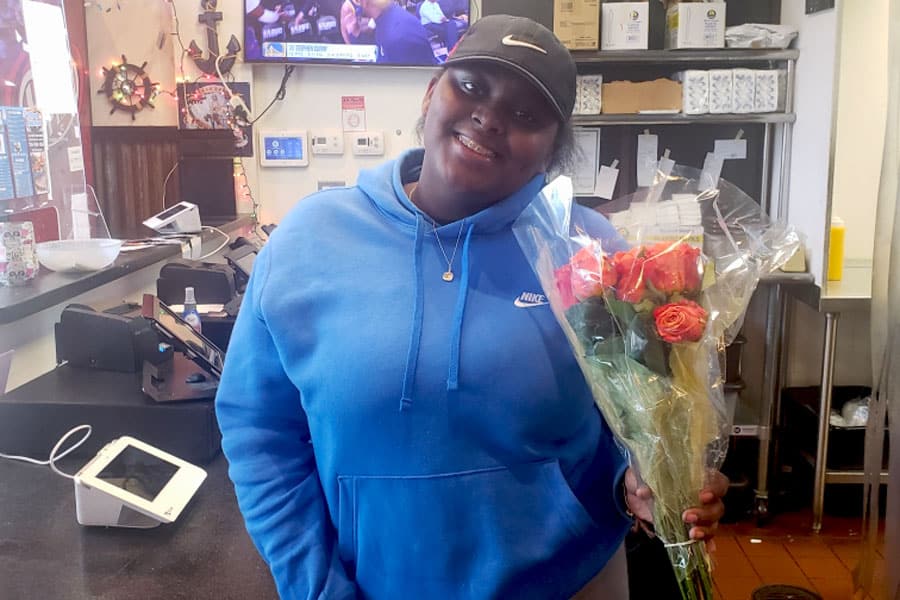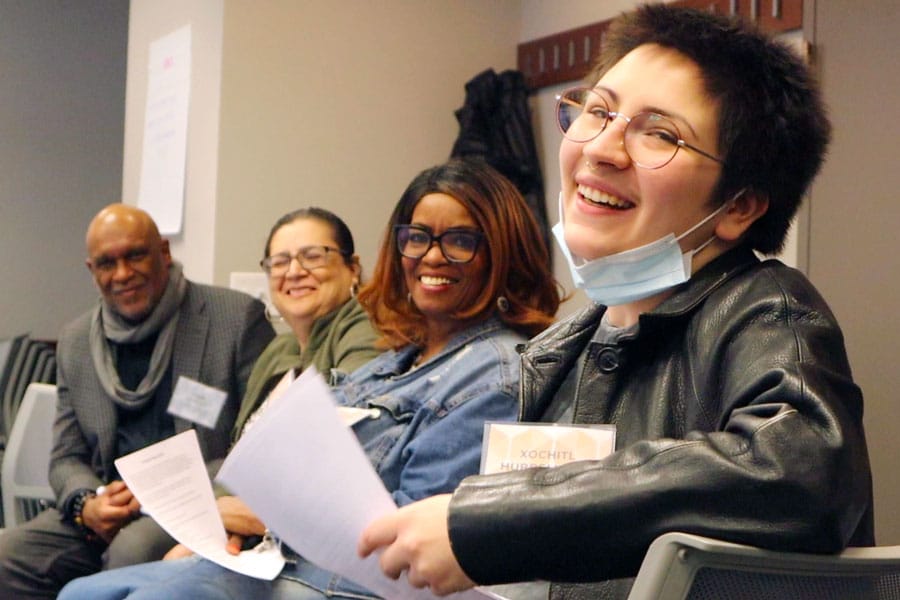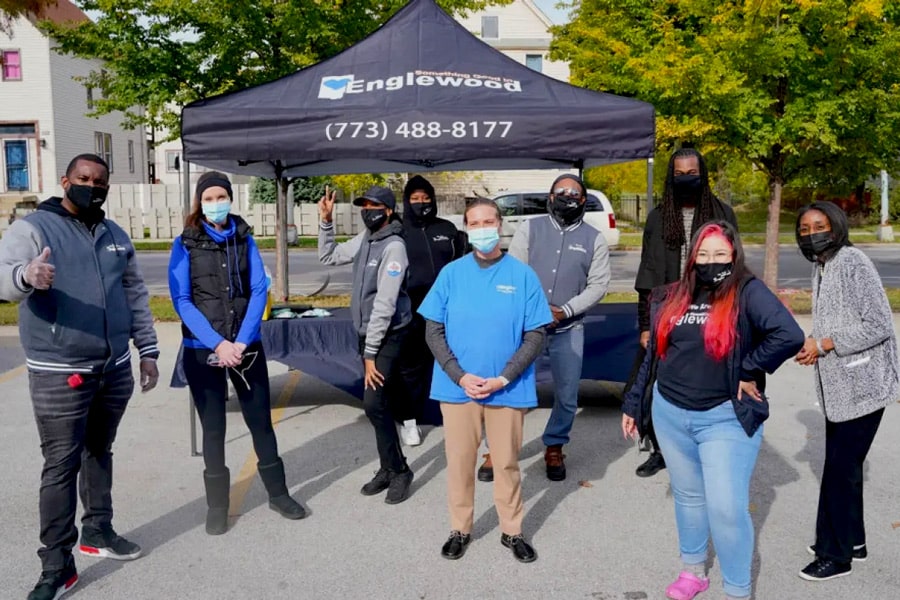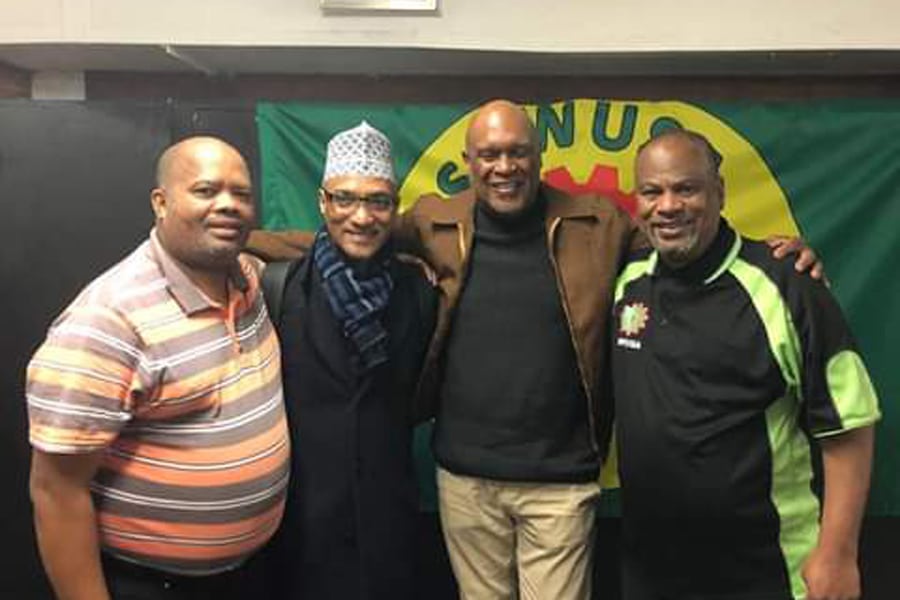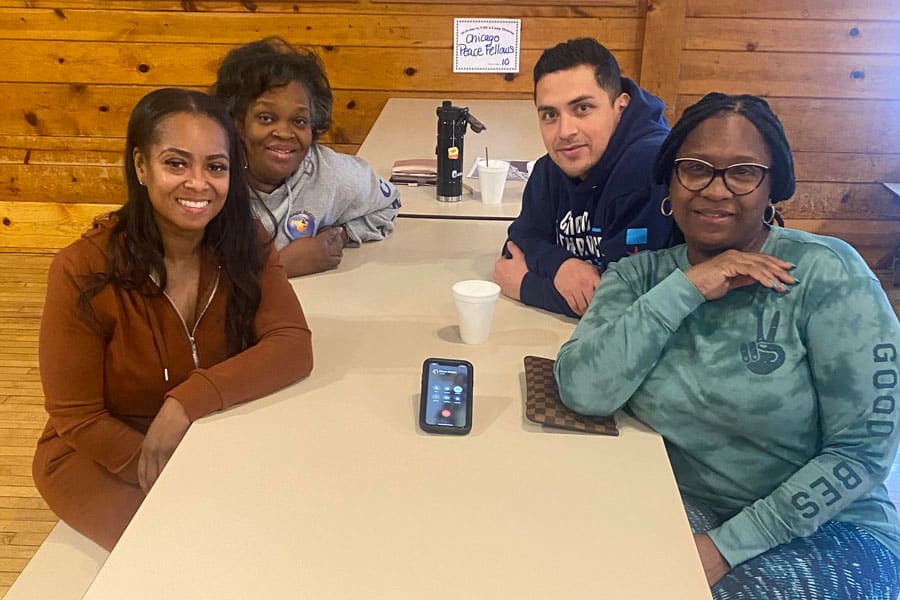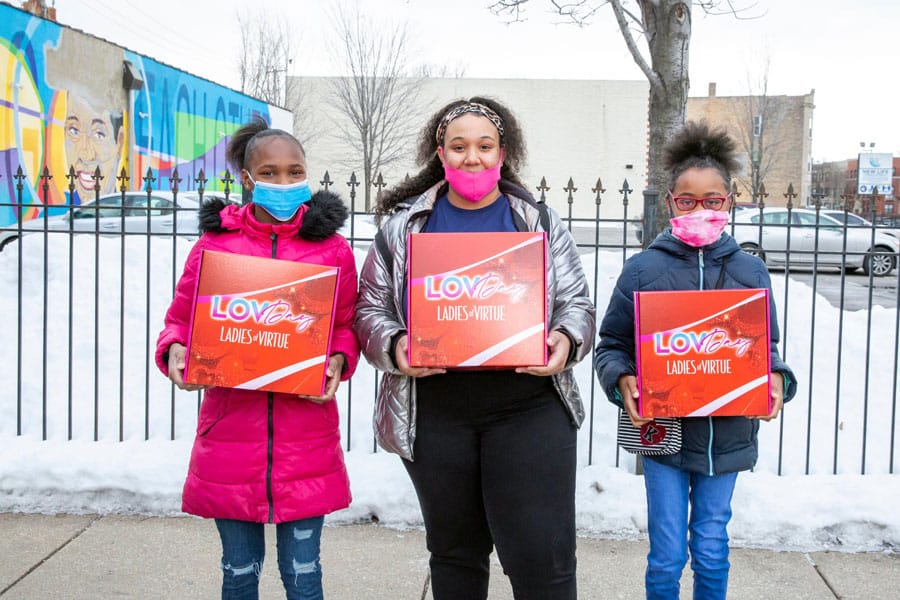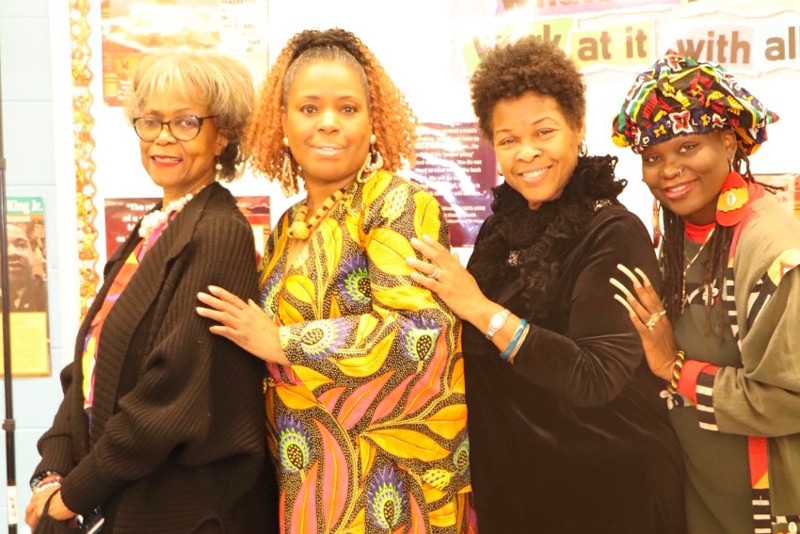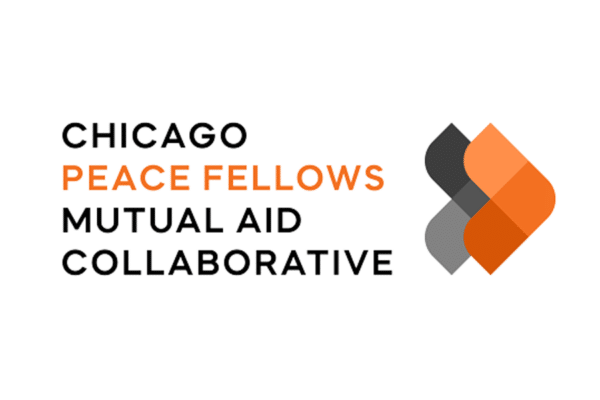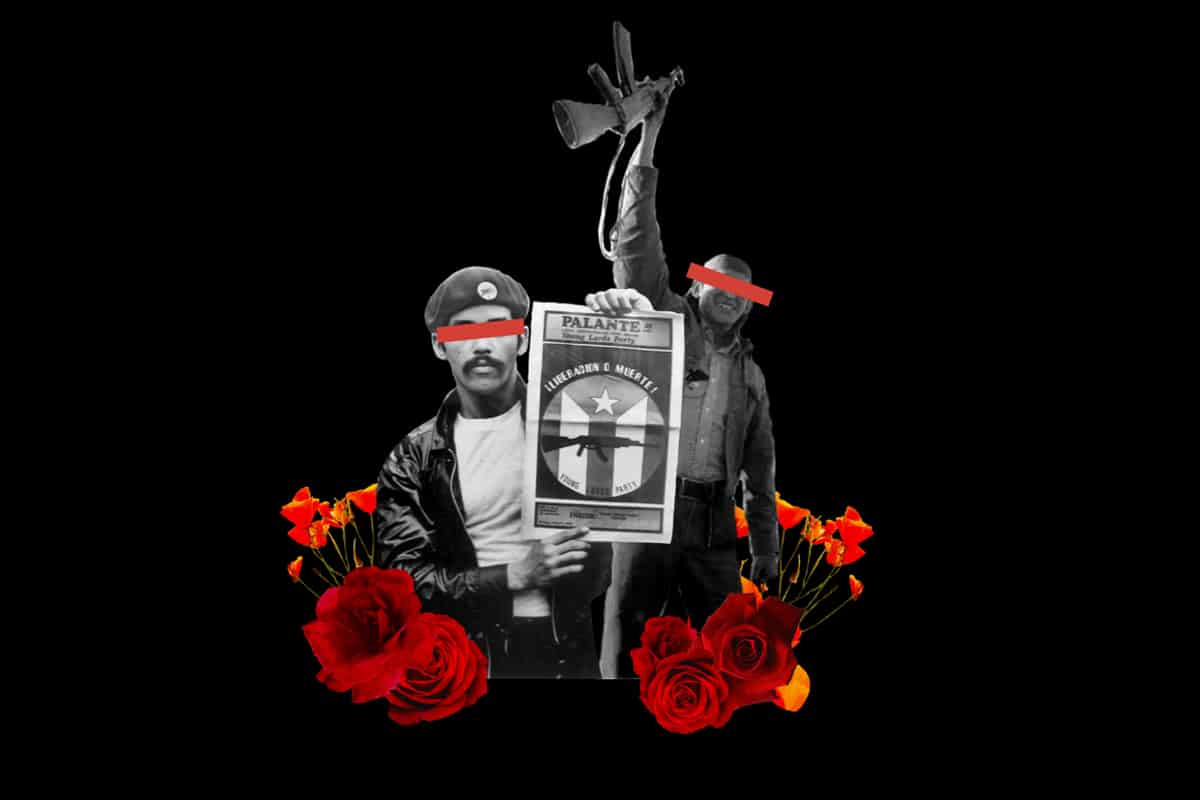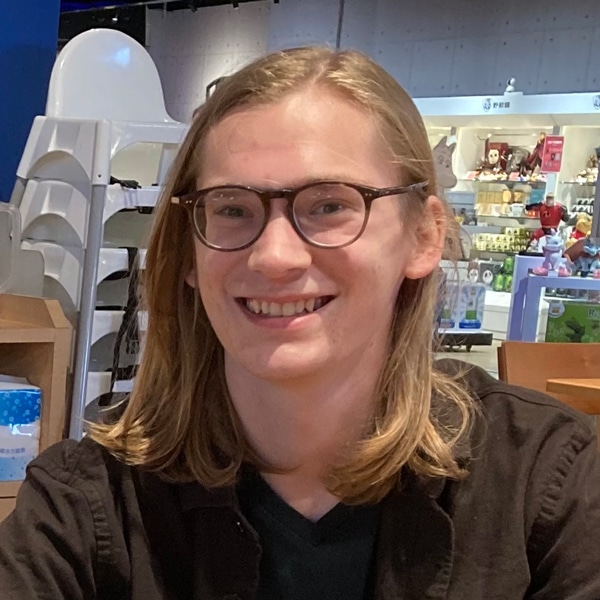Peace Flowers Bloom in Chicago
By Zeki Salah, Facilitator, Mutual Aid Collaborative
On Sunday May 1st and Friday May 6th, a group of Chicago Peace Fellows supplied 300 Mother's Day bouquets to mothers who have lost their children to violence in Chicago. Now in its third year, the Peace Flowers campaign was first launched in 2020, when over $5,000 were raised to deliver flowers to grieving mothers.

The Peace Flowers Campaign was first created by the Chicago Peace Fellows Mutual Aid Collaborative, a group of 60 Black and Brown leaders and committed allies who live and work in the communities they serve on the South and West sides. The project was developed by the Mutual Aid Collaborative with the twin goals of bringing comfort to mothers who had lost their children to gun violence and to raise funds for peace building projects in Chicago to prevent these tragedies in the future.

The flowers were obtained and distributed by the Greening Collective, a project formed under the Mutual Aid Collaborative. Peace Fellows from a range of communities across Chicago are involved in the Greening Collective. Their joint efforts supported the project, Peace Fellows involved include: Annamaria Leon of Homan Grown, L3C, Reshorna Fitzpatrick of the Historic Stone Temple, Pamela Montgomery-Bosley of Purpose Over Pain, and Bertha Purnell of Mothers on a Mission 28.
The Peace Flowers campaign was a collaborative effort that showcased the impact of having community-based organizations from across Chicago pool resources and ideas. Three organizations with ties to the Mutual Aid Collaborative partnered to deliver the flowers to mothers in their network: Purpose Over Pain, Mothers On a Mission 28, and Stone Temple Baptist Church. The collaborative nature of the project not only helped with finding funding and flowers, but also connected these resources to a community of mothers who had lost their children.

300 bouquets were distributed over the course of two days by the Peace Fellows. On May 1st, 150 bouquets were brought to Stone Temple Baptist Church and Mothers on a Mission 28 to be delivered to mothers across the South Side. Bouquets were also delivered to Purpose Over Pain on May 6th for their annual Mother’s Day Spa Day.

Pamela Bosley, Co-founder of Purpose Over Pain, connects mothers to build a community of support and has been involved in the Peace Flowers project for the last three years:
“Mother's Day is a very difficult day for mothers who lost their children to violence, but a simple beautiful bouquet of flowers brings gentle smiles to moms, helping them push through this painful day.”
Bittersweet emotions characterized the Peace Flowers campaign as mothers faced grief alongside a supportive community. Despite ongoing concerns surrounding violence, the work of community-based organizations on projects like the Peace Flowers campaign makes Chicago a more peaceful and beautiful place to live. Through supporting these grassroots organizations with connections and funding, the Peace Fellows Mutual Aid Collaborative has had a sustainable social impact.
2022 Chicago Peace Fellows Launched
On April 28, the 2022 cohort of the Chicago Peace Fellows met for the first time at the DePaul Center. The 2022 Peace Fellows cohort consists of activists, artists, social workers, and community leaders representing 14 community areas on the South and West sides of Chicago. Founded in 2019 in collaboration with the Partnership for Safe and Peaceful Communities, the Chicago Peace Fellows program is the only leadership development program that is built by and for grassroots community leaders on the South and West sides of Chicago.

The 2022 Peace Fellow Cohort will be the fourth group of Chicago Peace Fellows, following in the footsteps of over 60 alumni and joining a global network of Alumni featuring more than 100 grassroots leaders in over 30 countries. Pastor Reshorna, a 2021 Peace Fellow, spoke at the launch event and emphasized the value of the skills the Peace Fellows curriculum taught her. She spoke to the importance of learning an asset-based approach to community engagement:
"We had the opportunity to do asset mapping, to go out into our communities and see what was already there. Because most often, when we talk about our communities, people talk about what we don’t have. Well this approach says, ‘what do you already have in your community, what can you use to build on that, and how can you work with people to improve on that."

The 2022 Peace Fellows were also welcomed by Guillermo Vásquez de Velasco of DePaul University and Deborah Bennett of the Polk Bros. Foundation. Both Velasco and Bennett spoke to the lasting influence of the Peace Fellows program and its ability to provide tools and connections for grassroots leaders.

Peace Fellows were given a preview of the GATHER curriculum that they would be participating in over the course of their Fellowship. GATHER is both a mobile platform for shared learning and a curriculum for people who want to build on the talents of their neighbors and the assets of their communities to make real and lasting change. Members of the Goldin Institute emphasized that the Peace Fellows curriculum is not like a typical high school or college class, but is for Peace Fellows to gain new tools and networks for their efforts at community engagement.

Through the GATHER platform, the 2022 Peace Fellows will engage in a 22-week course of intensive shared learning as well as group projects, culminating in a graduation event in September 2022. The curriculum has been designed in collaboration with grassroots leaders, based on their practical knowledge and hard earned wisdom.
At their first meeting, the new Peace Fellows also had time to get to know one another and explore the diverse interests, skill sets, and leadership styles of their peers. The 2022 cohort consists of leaders from a variety of backgrounds, including street outreach, pastoral work, violence prevention, and the arts. The launch provided opportunities for Peace Fellows to speak with one another about their interests and work as well as explore their different leadership styles. Peace Fellows explored their strengths and needs as leaders through a leadership compass activity, where they grouped themselves categories derived from the cardinal directions. Many Fellows understood themselves as being in the Southern or Western parts of the compass, having empathetic or analytical leadership styles. However, as they discussed their strengths as leaders, the Peace Fellows explored how they often fell into different styles to suit their circumstances, sometimes falling into the Eastern “idea-oriented” or Southern “action-oriented” sides of the compass.

As the 2022 Peace Fellows progress through their curriculum, they will continue to build on the strength of their diversity through a series of collaborative projects. The 2022 cohort is made up of motivated problem-solvers and community-builders and their strengths will be shared as they take on community-oriented projects. After a series of GATHER based workshops, the Peace Fellows will have the opportunity to use the new techniques and concepts they’ve learned in collaborative projects. The diverse skills of the Peace Fellows will go on to form projects that aim to have a continuing impact preventing violence and remediating its consequences.
Building Safer Communities with the Chicagoland Vaccine Partnership
By Zeki Salah, Mutual Aid Collaborative Facilitator
Goldin Institute Peace Fellow, Annette Kelly, is helping host a series of workshops on Violence Prevention through her work with the Chicagoland Vaccine Partnership (CVP). Annette is the founder of FOUS Youth Development Services and was connected to the CVP through a funder of her organization. The CVP work focuses on sharing quality information about COVID vaccination in the communities hardest hit by COVID by mobilizing community leaders, educating community members and elevating multi-sector collaborations.

The CVP launched a learning community platform called the Learning Community in June 2021 that offered a unique virtual space for over 600 contact tracers, resource navigators, and concerned community members. In this space, community members could support each other in doing outreach about the COVID-19 vaccines and having open dialogue about health inequities and community organizing more broadly. This work was expanded by the CVP with the founding of the Learning Community Fellows, 11 members of the Learning Community that were hired to expand the outreach of the Learning Community and assist in curriculum development. Annette was selected as a Learning Community Fellow in October of 2021.

Prior to becoming a Learning Community Fellow, Annette had 15 years of experience running school based mentoring and violence prevention programs in the West Pullman community through her work with FOUS Youth Development Services. Through her work with the CVP, Annette is expanding her organization’s community impact by addressing the public health concerns regarding both COVID-19 and violence and their disproportionate effects on communities of color.
The goal of CVP’s Violence Prevention series is to invite the CVP Learning Community participants to see gun violence through the public health lens. The series aims to protect and improve the health of people and their communities and shows how community partnerships can address these issues. Two events have already been held, focusing on multi-sector collaborations and crime reporting and data. In the first event, Vaughn Bryant and Jesus Salazar of Metropolitan Family Services shared a network of community organizations that practice trauma-informed care and restorative justice practices. In the second event, Kimberley Smith of the University of Chicago Crime Lab showed how data about gun violence could be used to redirect resources to target populations most affected by that violence. Both events drew strong responses from the participants and provided a space for community dialogue and opportunities for collaboration.
The CVP’s Violence Prevention series will include two more workshops on violence intervention strategies and the impact of block clubs. The first of these events, Giving Hope: Innovative Violence Intervention Strategies, will occur on May 4th. It will aim to address the collective trauma of the COVID-19 pandemic by linking communities to trauma-informed mental health resources. The second event, Word on the Block: A Conversation About the Impact of Block Clubs, will be held on May 11th. This event will bring in people working with local Chicagoland Block Clubs to learn from them and provide space for community dialogue. Both events will continue the Violence Prevention series’ theme of illuminating how both violence and the COVID-19 pandemic affect public health on a broad and overarching level, while providing solutions that are community based and hyper-local.
Chicago and Cape Town Collaboration helps Capture History
By Reverend Berry Behr, 2021 Global Fellow, South Africa
A collaboration between two DePaul University students and the Cape Town Interfaith Initiative (CTII) has yielded a rare treasure – funding for the recording of an important personal account from an interfaith stalwart as part of our efforts to capture an oral history of the interfaith movement in South Africa.

As part of the DePaul students Intro to Non-Profit Management course at DePaul University with Professor John Zeigler, these students were inspired to volunteer to support this project across the globe when they heard about CTII’s Oral History Project. The students asked how they could help, and learned that each oral history recording costs in the region of USD500. So they immediately set to work, creating a GoFundMe campaign and reaching out to their friends and family.
Within just a couple of weeks, DePaul students Jenna Dahbur and Reese Elledge had raised enough to fund a recording for the archives of the significant interfaith work that contains many lessons of harmony, understanding and collaboration between diverse religious leaders in Cape Town.
"These oral history testimonies capture the interfaith efforts to end apartheid from those leaders on the front lines. We can preserve their stories that teach us so much about ending regimes of discrimination and the healing of communities from the wounds of separation."

In a beautiful twist of destiny, the funds will be used to record the story of Imam Rashied Omar who not only lectures at Notre Dame in the US and therefore contributes to the global body of knowledge on interfaith engagement, but is also a long-time friend of the Goldin Institute and an associate of Professor Ziegler who facilitated the collaboration between the students and CTII.
CTII looks forward to further collaboration with DePaul University students and is extremely grateful for their significant contribution.
Deepening Our Bonds at the Peace Fellows Retreat
By Zeki Salah, Mutual Aid Collaborative Facilitator
Last summer, the 2021 Chicago Peace Fellows collaboratively designed and launched seven peace building projects geared towards serving and building community with people throughout the Chicagoland area. The Peace Fellows Retreat was one of those projects and was designed to give back to the Fellows in return for all their hard work serving their communities and to strengthen relationships between the Peace Fellows.

During one of the summer project meetings, Peace Fellow Bertha Purnell expressed the need for the 2021 Fellows to take a retreat out in the woods to relax for a bit:
Sometimes things are so fast paced I need Post-it reminders as well as a calendar. The retreat was a time to slow down, breathe deep, and smell and feel the air.
Another Peace Fellow, Andrea Reed, couldn’t have agreed more:
Although, I love the work that I do and the fulfillment it brings...I am also very mindful that I need to unplug to take care of myself so that I can continue to feed into others.
During the fall, Bertha and Andrea took the lead on organizing the Retreat. Collaborating with a group of Fellows, their first goal was to find a space. In years past, other Fellows cohorts held retreats at hotels in downtown Chicago, but Bertha liked the idea of having the Fellows in nature and outside of their typical environment.

Andrea recommended the YMCA Camp Duncan Site because she had the opportunity to attend a leadership retreat there when she was student at DeVry University:
It was such a beautiful, restful and peaceful place. I always wanted to go back there, but never did. When we were discussing the need for a retreat, the words that kept coming to the surface were rest, peace, serenity which triggered my memory of Camp Duncan.
The logistics of the Peace Fellows retreat were negotiated collaboratively. Andrea showed the team pictures of the campsite to convince them it was a good location. In early December, a survey went out to all the 2021 Chicago Peace Fellows and March 18-20th was selected as the date. After a joint discussion, Fellows decided that the Retreat should focus on providing rest and reflection. Andrea and Bertha planned out snacks, activities, and other necessary supplies before sending out another survey to see what activities Fellows were interested in doing. Responses to the survey helped the Peace Fellows Retreat group plan time to enjoy nature, rest, and reflect on their time as Fellows.

Getting into nature was restorative for the Peace Fellows and helped them relax, connect with one another, and imagine new ways of engaging their communities. Andrea reported “the full breadth of this place is breathtaking and could never compare to the glitz and glamor of a swanky hotel.”
As the Fellows breathed in the fresh air they could not stop imagining the benefits this site could bring for kids. The next plan for this group is to take a few students to the campsite before the school year so they can relax and reflect as well. Andrea suggested:
“When we look for ways to reach our youth, I believe that exposing them to Camp Duncan with youth advisors who have the skill and experience in reaching our youth would prove to be very beneficial and most transformative.”
LOV Day Hosted by Ladies of Virtue, Chicago
By Cree Noble, Team Coordinator
On Saturday, February 5th, and Saturday, February 12th, the Ladies of Virtue hosted their annual LOV Day Celebration as an expression of their mission “to instill purpose, passion, and perseverance in girls, ages 9 to 18, while preparing them for college, careers and to become change agents in their communities". Ladies of Virtue is a Chicago-based non-profit founded by Chicago Peace Fellow Jamila Trimuel in 2011 with the goal of becoming the premier mentoring and leadership training organization for Black girls in the world.

LOV matches their participants with mentors and prepare them for leadership through our culturally relevant character building, career readiness and civic engagement curriculum. The team at Ladies of Virtue provides project management, collaboration and communication training via their two to four-month project experiences to empower girls to lead in the modern workforce. After graduating from high school, with successful completion of LOV's leadership program, participants are mentored and supported for six additional years as LOV 4 Life alumni.

LOV Day was birthed because “many Black girls feel that their concerns go mostly unaddressed and overlooked. Research confirms what our girls have been telling us all along. Due to stereotypes, a 2017 Georgetown Law Study showed that adults believe black girls ages 5-19 need less nurturing, protection, support, and comfort than their peers of the same age".
"We know that this perception is not reality. We want Black girls and young women to know that they are seen, heard, and loved." - Jamila Trimuel, Chicago Peace Fellow

This unfortunate reality mixed with a couple of years into the pandemic, LOV Day was more important than ever before. Since Black girls are oftentimes seen as older and less nurtured than their peers, many Black girls experience higher rates of detention and suspension than most. With the pandemic, more Black girls are reporting they feel depressed and isolated. Founder of Ladies of Virtue, Jamila Trimuel, expressed the importance of “LOV Day is to show love to our Black girls!”

The love that the Ladies of Virtue showed to the girls for this LOV Day started on February 5th with a pamper party. At the pamper party, girls came together to play games, receive manicures, masks, and overall receive a self-care day to show their appreciation to the ladies. The second gift the Ladies of Virtue created for girls was 350 LOV boxes that they would pass out to girls across the South Side of the city.

These boxes included Black History Facts, teddy bears, hair care products, and PPE. This event was sponsored by the Goldin Institute - Mutual Aid Collaborative. In addition, product sponsors included: University of Chicago, Mielle Organics, Renee Ramore, Ferrara, and Ms. P’s Gluten Free!

Jamila loves the impact LOV Day has on girls who are not a part of the Ladies of Virtue mentorship program. One of the current mentees of the program found out about Ladies of Virtue when she received a LOV Day box last year. After receiving the box she wanted to join the program.

Ladies of Virtue is currently in the middle of programming for their mentees. Upcoming events are the College Expo which will take place on April 2nd, a community service event with mentees on April 16th, and their Juneteenth event. Ladies of Virtue is also accepting donations for upcoming graduates of 8th grade and 12th grade to help them be prepared for high school and college. Lastly, they are seeking mentors! For more information check out their website at https://www.lovchicago.org/ .
Principles of Kwanzaa Can Unite Us
By Cree Noble, Team Coordinator
Last December 2021 Chicago Peace Fellow Pastor Victoria Brady and members of Big Mama Movement Chicago (a coalition which she co-founded) hosted The Black Family Reunion on the last 3 days of Kwanzaa. Big Mama Movement Chicago is a group of Black women who are calling for the unification of the Black Family. Pastor Victoria conceived the idea of hosting a global Black Family Reunion and thought, what better time to call for unity than during Kwanzaa.

Pastor Victoria (nicknamed Pastor V.) and six other Big Mamas embarked in the planning of the celebration, realizing that the principles of Kwanzaa can be used as a powerful instrument to bring Africans and the African Diaspora together. Also realizing that people right here in the United States do not understand Kwanzaa, Pastor V. states:
"There are so many misconceptions about Kwanzaa including that it is designed to replace Christmas. This is not true. Kwanzaa is a week-long celebration of the best of Blackness; it is a cultural celebration that uplifts families and the community.” - Pastor Victoria Brady
Pastor V. is continuing the work of creating safe spaces for civic and community engagement, making peace, and bringing a greater degree of peace and unity within the Black community. With the goal of building unity in mind, she plans to conduct a series of highly engaging and innovative teach-ins/workshops to share the importance of the Nguzo Saba which are the pillars upon which the principles of Kwanzaa are built. She is preparing to share this information with leaders in the U.S.A. and in different parts of Africa who can, then share the information within their communities. Pastor Victoria’s efforts are expanding to include Peace Fellows in Chicago and across the globe. The Nguzo Saba, which are shared here, has the potential to spark lasting changes in the way that Africans and the Diaspora view itself and our sometimes fragmented relationships stemming from chatel slavery where families and communities were ripped apart.

According to the National Museum of African American History and Culture, Kwanzaa is a time of learning, family, and celebration...families and communities come together to share a feast, to honor the ancestors, affirm the bonds between them, and to celebrate African and African American culture. Each day they light a candle to highlight the principle of that day and to breathe meaning into the principles with various activities, such as reciting the sayings or writings of great Black thinkers and writers, reciting original poetry, African drumming, and sharing a meal of African Diaspora-inspired foods.

The table is decorated with the essential symbols of Kwanzaa, such as the Kinara (Candle Holder), Mkeka (Mat), Muhindi (corn to represent the children), Mazao (fruit to represent the harvest), and Zawadi (gifts). One might also see the colors of the Pan-African flag, red (the struggle), black (the people), and green (the future), represented throughout the physical space and in the clothing worn by participants. These colors were first proclaimed to be the colors for all people of the African Diaspora by The Honorable Marcus Garvey. The seven principles of Kwanzaa to be put into daily practice are listed here:

“The teach-ins are designed to bring a greater awareness of Kwanzaa, demystify it, and to seek ways to improve the quality of life by incorporating the seven principles into the lives of Africans and her Diaspora rooted in Umoja (Unity) and Imani (Faith)” says Pastor V.
More information go to: https://nmaahc.si.edu/explore/stories/seven-principles-kwanzaa
Illuminating the Pathway to Racial Justice in Philanthropy
The Chicago Peace Fellows Mutual Aid Collaborative held a press conference on the anniversary of the assassination of Malcolm X to amplify the themes of their open letter, A Pathway to Anti-Racist Philanthropy. The Mutual Aid Collaborative members are all Alumni of the Chicago Peace Fellows program -- now 60 members strong across the South and West Sides -- who joined forces through the Collaborative as an ongoing platform for shared learning and collaboration.
During this interactive press conference, Collective members La'Keisha Gray-Sewell, David Gonzalez, Cosette Nazon-Wilburn, Victoria Brady, Gloria Smith and Annamaria Leon shared the core elements of the Funders Pledge, outlining critical steps that philanthropic leaders can take immediately to promote racial justice in funding.
Chicago Peace Fellows Mutual Aid Collaborative was born in 2020 to address the enduring legacy of racial injustice that has been laid bare by the disproportionate impact of the twin pandemics of violence and COVID-19 on our communities on the South and West sides of Chicago.
During the press conference, Fellows shared insights into how their Mutual Aid Collaborative can be an illustrative model for philanthropy to consider on their path to racial justice in funding. In particilar, the Collaborative uses a "pooled fund" approach where those closest to the issues make collective decisions, share their gifts and assets, and take collective action on priorities that are set by the communities they serve.
This powerful call for Racial Justice was echoed in an article in the Chicago Sun Times entitled Chicago philanthropies urged to sign pledge to ‘rectify racial inequity’ in their giving, featured in a news report on WBBM NewsRadio, and published as an op-ed in Crain's Chicago Business.
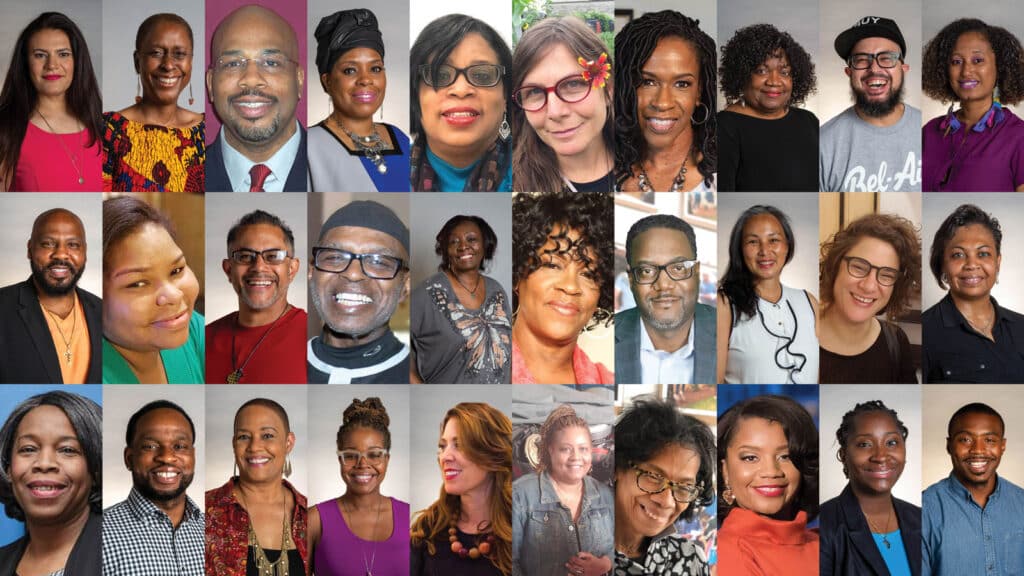
All Foundations, corporations, donors or aligned organizations that are willing to pledge to stand up for racial equity are invited to connect by completing this short form:
CONNECT WITH US
If you have questions or suggestions, please connect with us at funderspledge@goldininstitute.org or at (312) 951-1691.
Crime Stoppers Microgrant Awarded to StickTalk
By Cree Noble, Team Coordinator
Last summer, our 22 Chicago Peace Fellows collaboratively designed and supported a wide range of peace building projects using a dedicated pooled fund for violence prevention. When creating projects, Annette Kelly noticed many of these projects dealt with youth, health, and well-being, but not with crime prevention directly. During the summer, she voiced her idea about having a project called Crime Stoppers that would address the violence in Chicago by directly engaging with those most likely to be a perpetrator or victim of crime.
Annette’s idea was well received by many fellows, but Dorothy Thompson and Tia Brown really stepped up and helped Annette with the formation and execution of this plan. The Crime Stoppers team met biweekly to figure out what was the best course of action. A few ideas about violence prevention were brainstormed such as hosting workshops around the topic, but after weeks of discussion, the team decided they wanted to give out a microgrant to a nonprofit who was already working with violence prevention.
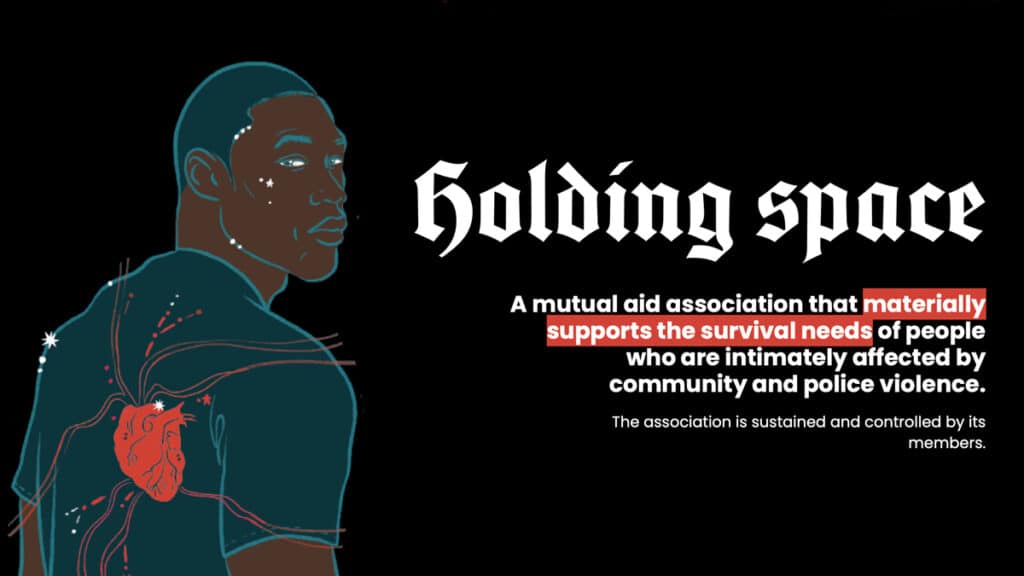
The application process was detailed and strategic in order to find the best candidate for this microgrant. Annette states, “we wanted to cast our nets wide” and wanted to look for an organization without all the “bells and whistles.” The microgrant was for $2,000 and 36 organizations applied. For the selection of the microgrant, Annette, Tia, and Dorothy came up with a rubric to follow as well as a scoring system. They ranked each group according to their mission statement, the population they served, and what they planned to do with the money.
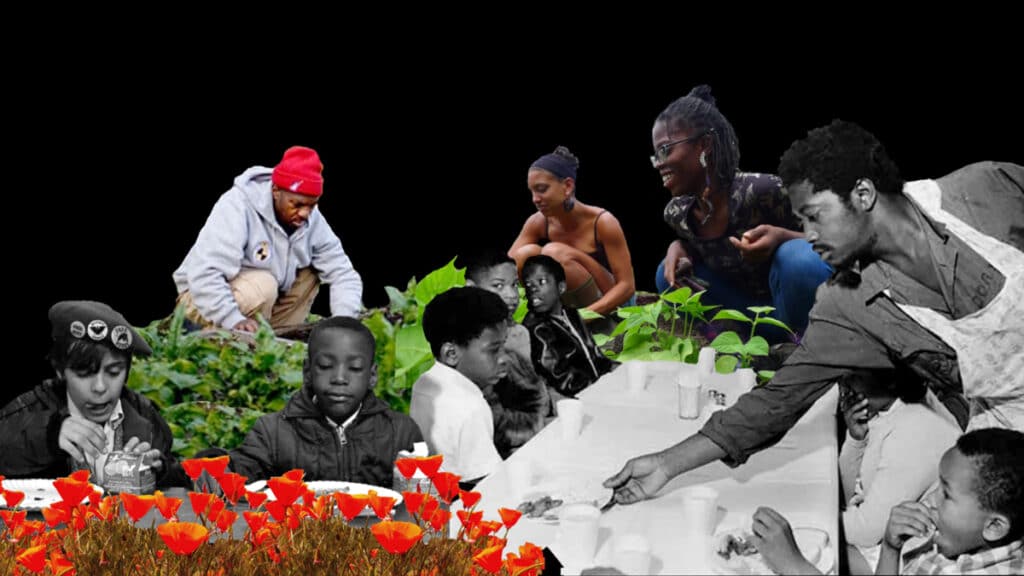
After weeks of going through each application, the organization Stick Talk was the recipient of the microgrant. According to Stick Talk’s website, “We reassess urban gun violence through the prisms of harm reduction and mutual aid. Our intention: to reduce the number of young Black people who are living at the edge of fatality, and to interrupt the demonization and criminalization of their politics of survival.” Tia says, “Stick Talk was the perfect organization for what we were looking for in a winner.”
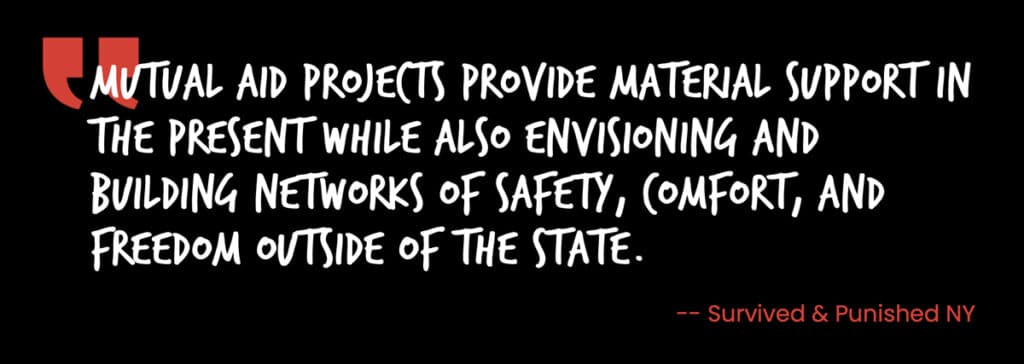
Crime Stoppers looks forward to seeing the grant be put in use at Stick Talk. They are also hoping to use extra funds they have to help families who have been impacted by violence.
Solidarity and Survival During COVID
By Yusuph Masanja, Co-Facilitator, Global Alumni Network
The Chicago Peace Fellows have tirelessly continued to find ways in helping families survive COVID. In the stories below, our Fellows, Jamila Trimuel, Dawn Hodges, and David Gonzalez are making a huge difference in South Side Chicago.
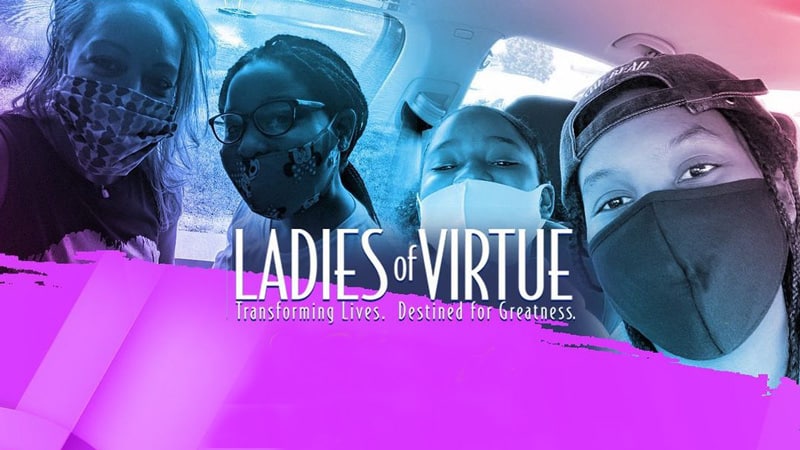
Chicago Peace Fellow, Jamila Trimuel, is a founder of Ladies of Virtue, an award-winning mentoring and leadership program that has empowered over 1,000 girls, ages 9 to 18, to become confident and purpose-driven leaders.
In 2020, Ladies of Virtue served the community with the support needed to survive the pandemic. They served 4,000 meals to 1,220 people in the community, they gave out school supplies, financial stipends, PPE and laptops for families.
We are so proud that we are not only serving the 200 girls we are serving this year but also over 1,000 community members. - Jamila Trimuel, Founder of Ladies of Virtue
This summer, Ladies of Virtue held their very first summer STEM program called “STEMuTiful". This program is a virtual summer experience promoting self-love, confidence, and beauty while increasing exposure to black women executives in the STEM and beauty industry. As a result, 84 percent of girls involved said the program increased their confidence and 100 percent of participants said that they learned more about STEM careers as a result of the program.
Jamila’s motivation to start Ladies of Virtue emanated from her own personal experience while in high school. She noticed some of the students, including her friends, were not planning for life after school. Having learned from constant encouragement from her parents to pursue her passion, Jamila knew that having positive role models in life to push you towards your dreams can really make a difference. So, while in college, she decided to become a mentor to help those students, to kind of push them along, and be a listening ear if needed. As she got older, Jamila realized that mentoring youth was her true passion, thus, she started Ladies of Virtue.
Go social with Ladies of Virtue this month to follow celebrations of the National Mentoring Month throughout January using #LOVChicago on Instagram, Facebook, and Twitter.
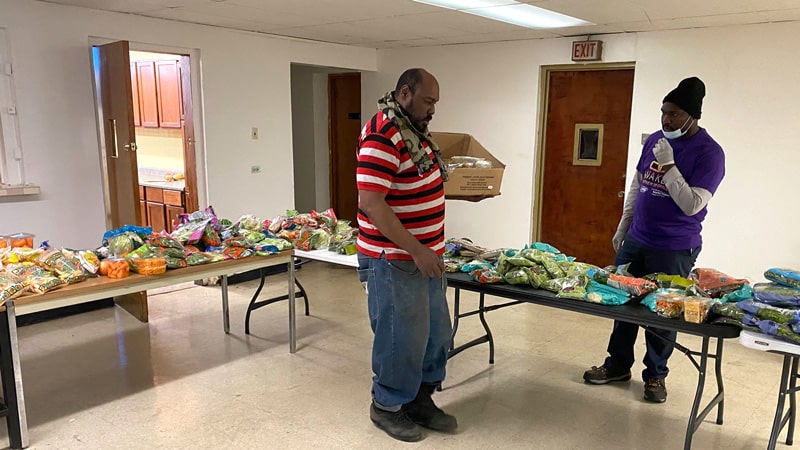
Dawn Hodges, Chicago Peace Fellow and the Executive Director at Imani Community Development Corporation is busy gathering and distributing as many resources as possible to neighbors in need. For over 40 years, the Imani community has been a pillar in the neighborhood, primarily focusing on mentoring, out-of-school programming, and food distribution.
Whatever is needed by the community we try to gather, that’s not our usual model but that’s what we do right now. We try to be of service to our community as much as we can. - Dawn Hodges
Dawn and her team provide monthly food distributions serving 200 families. COVID complicated their operations but they never stopped. Dawn and her team didn't miss a month in 2020, even with the pandemic. "We just kept going,” Dawn says.
As Dawn continues to gather and distribute resources, she is requesting any help that could be given to further support communities in need. More importantly, Dawn requests more and more prayers from us. The following quote from Marianne Williamson inspires Dawn and she shares it often with her peers:
Our deepest fear is not that we are weak. Our deepest fear is that we are powerful beyond measure. It is our light, not our darkness that most frightens us. We ask ourselves, who am I to be brilliant, gorgeous, talented, fabulous? Actually, who are you not to be?
Focus areas like, after school summer programs and mentorship for young men, are hugely affected. They recently conducted a virtual summer camp and continue to engage kids virtually, but it is challenging. Dawn says, “Now we do check-ins but it’s not the same, getting kids to focus on a call is a big problem.”
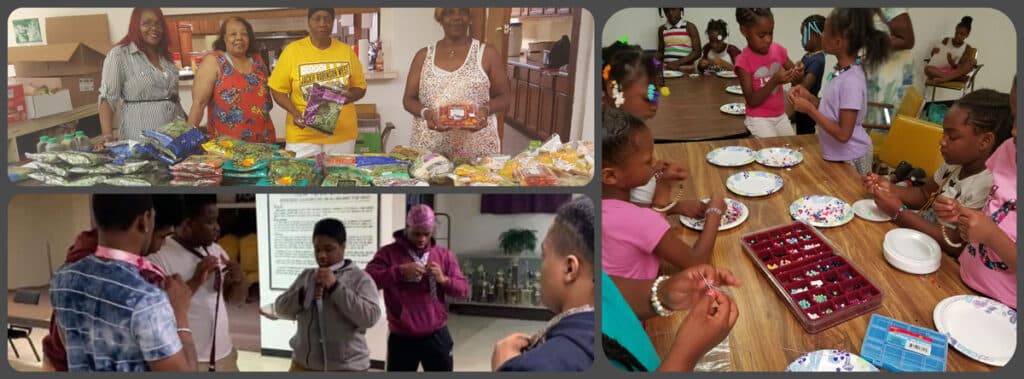
Chicago Peace Fellow, David Hommy Gonzalez, is the Executive director of Port Ministries, a non-profit in Chicago offering free clinic services, after school and food distribution programs. They also run art programs and the adult education program called the People's School.
David and his team had no idea how to get sandwiches donated anymore when the pandemic hit. They reached out to individuals and so many were willing to make sandwiches in their houses and leave it at their doors for a driver to pick up and donate. David found this to be an interesting way to allow people to volunteer from a place they are comfortable, their houses!
Our food provision had to adjust during the pandemic. We had to partner more. - David Gonzalez
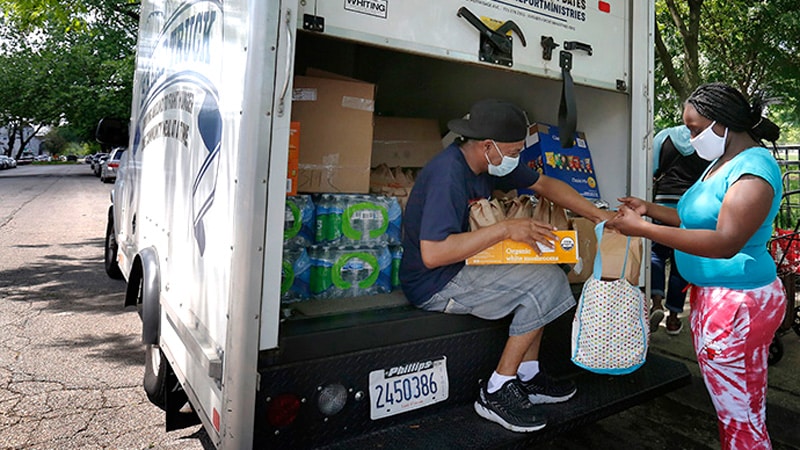
David owes the Port Ministries vision to his mother. He remembers being very poor in his hometown. His mother went hungry many times, buying food only for David but failing to provide for herself.
Now that I am educated and have a good position. It’s my responsibility to use that privilege to give our Mamas all the tools possible. I created that free clinic because I remember my medical struggle, I created the bread truck because I remember going hungry—you never forget what going hungry feels like. You never forget how it feels like to be homeless. - David Gonzalez
David manages expectations by surprising people with food during distribution. He is trying to avoid disappointment—in times when food is not available, but people still expect it to come. David says, “The one thing about hunger is that it comes back tomorrow, it is never fully solved. All we can do is keep throwing food at that problem and know that tomorrow it comes back. So, we spread out and go to different locations, it’s not like someone is surviving on us, we are trying to feed as many people as possible, and the moment they do survive on us there is a different program for that. Because that needs more attention.”
With his nonprofit, David is now collaborating with other Goldin Fellows in various programs, fitting in the puzzle pieces to really catch all the community needs. Using their truck, they assist in delivering food to elderly people in need. “If someone needs our help to deliver food, we got you,” David says.
